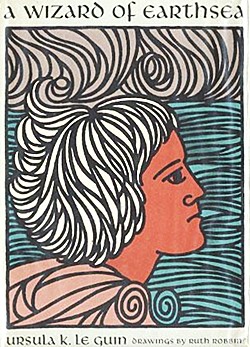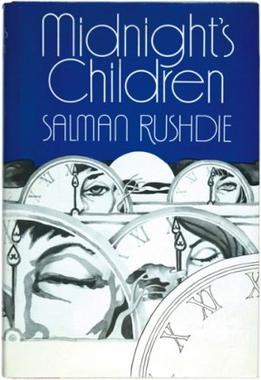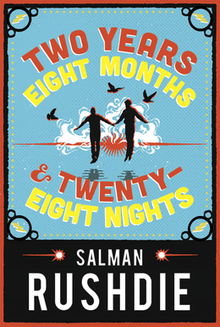
A Wizard of Earthsea is a fantasy novel written by American author Ursula K. Le Guin and first published by the small press Parnassus in 1968. It is regarded as a classic of children's literature and of fantasy, within which it is widely influential. The story is set in the fictional archipelago of Earthsea and centers on a young mage named Ged, born in a village on the island of Gont. He displays great power while still a boy and joins a school of wizardry, where his prickly nature drives him into conflict with a fellow student. During a magical duel, Ged's spell goes awry and releases a shadow creature that attacks him. The novel follows Ged's journey as he seeks to be free of the creature.

Sir Ahmed Salman Rushdie is an Indian-born British-American novelist. His work often combines magic realism with historical fiction and primarily deals with connections, disruptions, and migrations between Eastern and Western civilizations, typically set on the Indian subcontinent. Rushdie's second novel, Midnight's Children (1981), won the Booker Prize in 1981 and was deemed to be "the best novel of all winners" on two occasions, marking the 25th and the 40th anniversary of the prize.

Ursula Kroeber Le Guin was an American author best known for her works of speculative fiction, including science fiction works set in her Hainish universe, and the Earthsea fantasy series. She was first published in 1959, and her literary career spanned nearly sixty years, producing more than twenty novels and over a hundred short stories, in addition to poetry, literary criticism, translations, and children's books. Frequently described as an author of science fiction, Le Guin has also been called a "major voice in American Letters". Le Guin said she would prefer to be known as an "American novelist".

The Dispossessed is a 1974 anarchist utopian science fiction novel by American writer Ursula K. Le Guin, one of her seven Hainish Cycle novels. It is one of a small number of books to win all three Hugo, Locus and Nebula Awards for Best Novel. It achieved a degree of literary recognition unusual for science fiction due to its exploration of themes such as anarchism and revolutionary societies, capitalism, utopia, individualism, and collectivism.
The Hainish Cycle consists of a number of science fiction novels and stories by Ursula K. Le Guin. It is set in a future history in which civilizations of human beings on planets orbiting a number of nearby stars, including Terra ("Earth"), are contacting each other for the first time and establishing diplomatic relations, and setting up a confederacy under the guidance of the oldest of the human worlds, peaceful Hain. In this history, human beings did not evolve on Earth but were the result of interstellar colonies planted by Hain long ago, which was followed by a long period when interstellar travel ceased. Some of the races have new genetic traits, a result of ancient Hainish experiments in genetic engineering, including people who can dream while awake, and a world of hermaphroditic people who only come into active sexuality once a month, not knowing which sex will manifest in them. In keeping with Le Guin's style, she uses varied social and environmental settings to explore the anthropological and sociological outcomes of human evolution in those diverse environments.

Midnight's Children is a 1981 novel by Indian-British writer Salman Rushdie, published by Jonathan Cape with cover design by Bill Botten, about India's transition from British colonial rule to independence and partition. It is a postcolonial, postmodern and magical realist story told by its chief protagonist, Saleem Sinai, set in the context of historical events. The style of preserving history with fictional accounts is self-reflexive.

The Earthsea Cycle, also known as Earthsea, is a series of high fantasy books written by the American author Ursula K. Le Guin. Beginning with A Wizard of Earthsea (1968), The Tombs of Atuan, (1970) and The Farthest Shore (1972), the series was continued in Tehanu (1990), and Tales from Earthsea and The Other Wind. In 2018, all the novels and short stories were published in a single volume, The Books of Earthsea: The Complete Illustrated Edition, with artwork by Charles Vess.

Tehanu, initially subtitled The Last Book of Earthsea, is a fantasy novel by the American author Ursula K. Le Guin, published by Atheneum in 1990. It is the fourth novel set in the fictional archipelago Earthsea, following almost twenty years after the first three Earthsea novels (1968–1972), and not the last, despite its subtitle. It won the annual Nebula Award for Best Novel and the Locus Award for Best Fantasy Novel.

Always Coming Home is a 1985 science fiction novel by American writer Ursula K. Le Guin. It is in parts narrative, pseudo-textbook and pseudo-anthropologist's record. It describes the life and society of the Kesh people, a cultural group who live in the distant future long after modern society has collapsed. It is presented by Pandora, who seems to be an anthropologist or ethnographer from the readers' contemporary culture, or a culture very close to it. Pandora describes the book as a protest against contemporary civilization, which the Kesh call "the Sickness of Man".

Haroun and the Sea of Stories is a 1990 children's novel by Salman Rushdie. It is Rushdie's fifth major publication, and followed The Satanic Verses (1988). It is a phantasmagorical story that begins in a city so sad and ruinous that it has forgotten its name.

The Telling is a 2000 science fiction novel by Ursula K. Le Guin set in her fictional universe of Hainish Cycle. The Telling is Le Guin's first follow-up novel set in the Hainish Cycle since her 1974 novel The Dispossessed. It tells the story of Sutty, a Terran sent to be an Ekumen observer, on the planet Aka, and her experiences of political and religious conflicts between a corporatist government and the indigenous resistance, which is centered on the traditions of storytelling, locally referred to as "the Telling".

The Enchantress of Florence is the ninth novel by Salman Rushdie, published in 2008. According to Rushdie this is his "most researched book" which required "years and years of reading".

Lavinia is the Locus Award-winning novel by American author Ursula K. Le Guin. Published in 2008, it was Le Guin's last novel. It is written in a first-person, self-conscious style that recounts the life of Lavinia, a minor character in Virgil's epic poem the Aeneid.

"The Shobies' Story" is a 1990 science fiction novella by American writer Ursula K. Le Guin, describing the story of the first human crew to participate in a newly invented faster-than-light mode of space travel. It was first published in the anthology Universe 1 and subsequently appeared in A Fisherman of the Inland Sea published by Harper Prism in 1994.

The Left Hand of Darkness is a science fiction novel by U.S. writer Ursula K. Le Guin. Published in 1969, it became immensely popular, and established Le Guin's status as a major author of science fiction. The novel is set in the fictional Hainish universe as part of the Hainish Cycle, a series of novels and short stories by Le Guin, which she introduced in the 1964 short story "The Dowry of Angyar". It was fourth in sequence of writing among the Hainish novels, preceded by City of Illusions, and followed by The Word for World Is Forest.
Earthsea is a fictional world originally created by Ursula K. Le Guin for her short story "The Word of Unbinding", published in 1964. Earthsea became the setting for a further six books, beginning with A Wizard of Earthsea, first published in 1968, and continuing with The Tombs of Atuan, The Farthest Shore, Tehanu, Tales from Earthsea and The Other Wind. Nine short stories by Le Guin are also set in Earthsea; the earliest two in her 1975 collection of short stories The Wind's Twelve Quarters, five in Tales from Earthsea, and the final two in an illustrated collection in The Books of Earthsea. Collectively, the series is simply known as Earthsea.

"Coming of Age in Karhide" is a science fiction short story by Ursula K. Le Guin, first published in 1995. The story is set on the fictional planet of Gethen, the same as Le Guin's 1969 novel The Left Hand of Darkness, and is a part of Le Guin's Hainish cycle. The story explores themes of growing into adulthood on a planet where individuals have no fixed gender identity. Reviewers stated that the story went further than Left Hand in its exploration of gender and sexuality, and was a "quietly feminist" work. It was also described as lacking the "dizzying impact" of Left Hand. In 2002, it was anthologized in the volume The Birthday of the World, along with many other stories exploring marriage and sexual relationships.
Peter Kihlgård, born 10 April 1954 in Örebro, is a Swedish author, playwright and translator.
Aslı Biçen is a Turkish novelist and translator.














